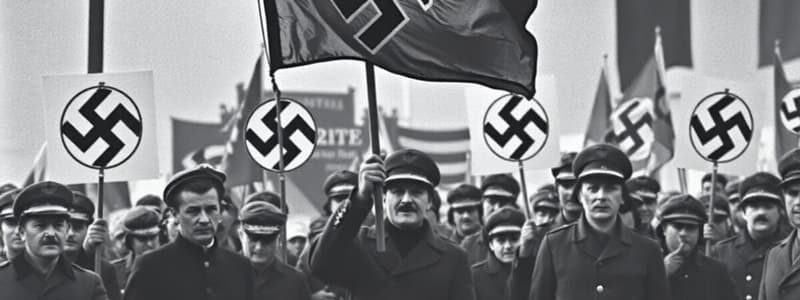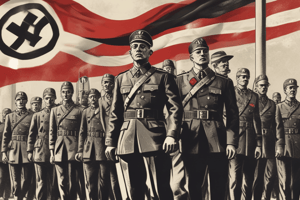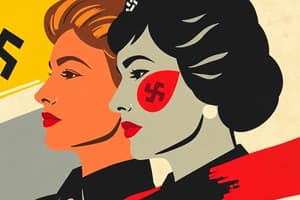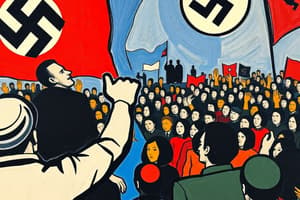Podcast
Questions and Answers
What was one of the primary focuses of the Nazis regarding culture during the 1934 Nuremberg Rally?
What was one of the primary focuses of the Nazis regarding culture during the 1934 Nuremberg Rally?
- Modern art and experimental literature
- Modern music and dance forms
- International cultural exchange
- Romantic ideals of Germany's past (correct)
The Reich Chamber of Culture was established to promote modern art and culture.
The Reich Chamber of Culture was established to promote modern art and culture.
False (B)
What was the role of the Reich Chamber of Creative Art?
What was the role of the Reich Chamber of Creative Art?
To oversee jobs related to architecture, decoration, sculpture, painting, engraving, and dealing in works of art.
The Reich Chamber of _____ was responsible for overseeing authors and book dealers.
The Reich Chamber of _____ was responsible for overseeing authors and book dealers.
Match the following Reich Chambers with their corresponding jobs affected:
Match the following Reich Chambers with their corresponding jobs affected:
What was the primary purpose of the 1936 Berlin Olympics for Hitler and the Nazis?
What was the primary purpose of the 1936 Berlin Olympics for Hitler and the Nazis?
Jesse Owens won three gold medals at the 1936 Berlin Olympics.
Jesse Owens won three gold medals at the 1936 Berlin Olympics.
Which group was formed in opposition to Nazi interference in the Church?
Which group was formed in opposition to Nazi interference in the Church?
Who directed the film documenting the events of the 1936 Berlin Olympics?
Who directed the film documenting the events of the 1936 Berlin Olympics?
The stadium built for the 1936 Berlin Olympics could hold up to _______ spectators.
The stadium built for the 1936 Berlin Olympics could hold up to _______ spectators.
The majority of the opposition to the Nazi regime was public and widespread.
The majority of the opposition to the Nazi regime was public and widespread.
Match the following athletes or figures with their associated events or works:
Match the following athletes or figures with their associated events or works:
What was the role of the police forces under the Nazi regime?
What was the role of the police forces under the Nazi regime?
What was one effect of the 1936 Berlin Olympics on Nazi Germany's image?
What was one effect of the 1936 Berlin Olympics on Nazi Germany's image?
The Nazis sent many political opponents to __________ camps.
The Nazis sent many political opponents to __________ camps.
Which of the following groups demonstrated public resistance to the Nazis?
Which of the following groups demonstrated public resistance to the Nazis?
Name one way the Olympics created positive propaganda for the Nazis.
Name one way the Olympics created positive propaganda for the Nazis.
What event in 1943 contributed to an increase in opposition to the Nazis?
What event in 1943 contributed to an increase in opposition to the Nazis?
The international nature of the Olympics allowed the Nazis to display their power and strength to the world.
The international nature of the Olympics allowed the Nazis to display their power and strength to the world.
Match the following groups to their characteristics:
Match the following groups to their characteristics:
The Nazis employed judges in court trials to ensure fair outcomes.
The Nazis employed judges in court trials to ensure fair outcomes.
What was one major reason many Protestants supported the Nazi Party by 1933?
What was one major reason many Protestants supported the Nazi Party by 1933?
Ludwig Müller was appointed as Reich Bishop of the unified Protestant Church referred to as the Reich Church.
Ludwig Müller was appointed as Reich Bishop of the unified Protestant Church referred to as the Reich Church.
What was the main role of the Pastors’ Emergency League (PEL)?
What was the main role of the Pastors’ Emergency League (PEL)?
Around 2,000 individual churches joined the __________ Church.
Around 2,000 individual churches joined the __________ Church.
What was one action taken by the Nazi regime against Jewish people in the Reich Church?
What was one action taken by the Nazi regime against Jewish people in the Reich Church?
Match the following terms with their descriptions:
Match the following terms with their descriptions:
The swastika was displayed in some Reich Church congregations.
The swastika was displayed in some Reich Church congregations.
Name one example of a youth group that resisted the Nazi regime.
Name one example of a youth group that resisted the Nazi regime.
How many writers did the Nazis ban for not conforming to their beliefs?
How many writers did the Nazis ban for not conforming to their beliefs?
Books written by authors of Jewish descent were allowed to be published by the Nazis.
Books written by authors of Jewish descent were allowed to be published by the Nazis.
What was the purpose of the films produced by the Nazis?
What was the purpose of the films produced by the Nazis?
In May 1933, students in Berlin burned _____ books by anti-Nazi authors.
In May 1933, students in Berlin burned _____ books by anti-Nazi authors.
Match the following Nazi propaganda techniques with their descriptions:
Match the following Nazi propaganda techniques with their descriptions:
Which of the following films was created by the Nazis to spread political messages about communism?
Which of the following films was created by the Nazis to spread political messages about communism?
All film plots created during the Nazi regime were approved by the officials.
All film plots created during the Nazi regime were approved by the officials.
Who delivered a speech encouraging the burning of books at a Nazi rally?
Who delivered a speech encouraging the burning of books at a Nazi rally?
What was one of the actions taken against Jewish businesses during Kristallnacht?
What was one of the actions taken against Jewish businesses during Kristallnacht?
Approximately 191 synagogues were destroyed during Kristallnacht.
Approximately 191 synagogues were destroyed during Kristallnacht.
How much were Jewish people made to pay for the damages incurred during the attacks?
How much were Jewish people made to pay for the damages incurred during the attacks?
Around _______ Jewish people were sent to concentration camps.
Around _______ Jewish people were sent to concentration camps.
How did most Germans react to the persecution of Jewish people by 1939?
How did most Germans react to the persecution of Jewish people by 1939?
Acts of violence and discrimination toward Jewish people did not shock many Germans.
Acts of violence and discrimination toward Jewish people did not shock many Germans.
What were the names of the groups that instilled fear in Germans during the Jewish persecution?
What were the names of the groups that instilled fear in Germans during the Jewish persecution?
Flashcards
Did More People Support Than Oppose the Nazis?
Did More People Support Than Oppose the Nazis?
A large majority of the German people either supported the Nazi Party or simply conformed to their policies, displaying a lack of open resistance.
Control over Information
Control over Information
The Nazis effectively controlled the spread of information, promoting their ideology and suppressing dissenting voices.
The Police as a Tool of Control
The Police as a Tool of Control
The police, acting as an arm of the Nazi regime, instilled fear and silenced opposition through intimidation and punishment.
Nazi Influence in Court Trials
Nazi Influence in Court Trials
Signup and view all the flashcards
Opposition to the Nazis
Opposition to the Nazis
Signup and view all the flashcards
Private Opposition
Private Opposition
Signup and view all the flashcards
Religious Opposition
Religious Opposition
Signup and view all the flashcards
The Confessing Church
The Confessing Church
Signup and view all the flashcards
Nazi Control of Arts and Culture
Nazi Control of Arts and Culture
Signup and view all the flashcards
The Reich Chamber of Culture
The Reich Chamber of Culture
Signup and view all the flashcards
Different Chambers of the Reich Chamber of Culture
Different Chambers of the Reich Chamber of Culture
Signup and view all the flashcards
Nazi Art
Nazi Art
Signup and view all the flashcards
Nazi Control over Film
Nazi Control over Film
Signup and view all the flashcards
Confessing Church
Confessing Church
Signup and view all the flashcards
Reich Church
Reich Church
Signup and view all the flashcards
Pastors' Emergency League
Pastors' Emergency League
Signup and view all the flashcards
Ludwig Müller
Ludwig Müller
Signup and view all the flashcards
Nazi Support Among Protestants
Nazi Support Among Protestants
Signup and view all the flashcards
Nazi Control Over Germany
Nazi Control Over Germany
Signup and view all the flashcards
Gestapo
Gestapo
Signup and view all the flashcards
Opposition to the Nazi Regime
Opposition to the Nazi Regime
Signup and view all the flashcards
Propaganda Value of the 1936 Olympics
Propaganda Value of the 1936 Olympics
Signup and view all the flashcards
Nazi Propaganda in the 1936 Olympics
Nazi Propaganda in the 1936 Olympics
Signup and view all the flashcards
Jesse Owens and the 1936 Olympics
Jesse Owens and the 1936 Olympics
Signup and view all the flashcards
Leni Riefenstahl's Film "Olympia"
Leni Riefenstahl's Film "Olympia"
Signup and view all the flashcards
Why were the 1936 Olympics important to Hitler?
Why were the 1936 Olympics important to Hitler?
Signup and view all the flashcards
What is the PEE structure?
What is the PEE structure?
Signup and view all the flashcards
What is an "explain why" question?
What is an "explain why" question?
Signup and view all the flashcards
How to answer History questions
How to answer History questions
Signup and view all the flashcards
Nazi control over media
Nazi control over media
Signup and view all the flashcards
Nazi book censorship
Nazi book censorship
Signup and view all the flashcards
Nazi propaganda films
Nazi propaganda films
Signup and view all the flashcards
Nazi films used for political messaging
Nazi films used for political messaging
Signup and view all the flashcards
Nazi control of cinema
Nazi control of cinema
Signup and view all the flashcards
Radio broadcasts and Hitler's speeches
Radio broadcasts and Hitler's speeches
Signup and view all the flashcards
Nazi control of newspapers
Nazi control of newspapers
Signup and view all the flashcards
Using arts and entertainment for propaganda
Using arts and entertainment for propaganda
Signup and view all the flashcards
Kristallnacht
Kristallnacht
Signup and view all the flashcards
The Holocaust
The Holocaust
Signup and view all the flashcards
Nazi Ideology
Nazi Ideology
Signup and view all the flashcards
Totalitarian Control
Totalitarian Control
Signup and view all the flashcards
The Gestapo
The Gestapo
Signup and view all the flashcards
The SS
The SS
Signup and view all the flashcards
Concentration Camps
Concentration Camps
Signup and view all the flashcards
Jewish Persecution
Jewish Persecution
Signup and view all the flashcards
Study Notes
Nazi Control of Germany (1933-1945)
- The Nazi regime employed various strategies to exert control over German society, including censorship, propaganda, and the suppression of opposition.
- Propaganda utilized numerous mediums, like newspapers, radio, and film, to promote Nazi ideology and glorify the regime.
- The regime's control over the media was crucial in shaping public opinion and maintaining support for Nazi policies.
- Censorship and the suppression of dissent were fundamental in maintaining power and preventing contradictory viewpoints.
- The Nazi Party faced opposition from various segments of German society.
- Opposition came from within the military, religious groups (Catholic and Protestant churches), political parties (Social Democrats, Communists), and youth groups like the Swing Youth, the Edelweiss Pirates, and the White Rose.
- Opposition was often private and covert due to fear of persecution, imprisonment, or execution.
- Groups persecuted by the Nazi regime included minorities, political opponents, and those deemed "undesirable" by the regime's ideology, encompassing Jews, Roma, homosexuals, people with disabilities, and others deemed a threat to the racially pure German state.
Nazi Persecution of Minorities
- The Nazi regime persecuted various minority groups throughout their rule. This persecution was fueled by racial ideology.
- Jews were a major target; policies increased discrimination, leading to forced emigration, segregation, and ultimately the Holocaust.
- Roma, homosexuals, and disabled individuals also faced persecution and discrimination.
- The Nuremberg Laws of 1935 were particularly impactful, stripping Jews of their German citizenship and rights.
- Nazi policies created concentration camps and extermination camps for the systematic persecution and murder of people targeted by the Nazi regime.
- These tactics included forced resettlement, exclusion from public life, and the violent elimination of those considered threats to the Nazi state.
Nazi Opposition and Resistance
- Significant opposition to the Nazi regime existed, though often covert.
- Various groups and individuals resisted in different ways, including within the armed forces, churches, and social groups.
- Internal resistance was often very risky, and those opposing the regime were often severely punished.
- The 'Night of the Long Knives' was a highly violent purge against Nazi political opponents, demonstrating the regime's capacity for violence to consolidate its power.
Nazi Control Through the Legal System
- The Nazi regime exerted significant control over the legal system, shaping the courts and legal proceedings to favor their interests.
- Judges and lawyers were expected to prioritize Nazi party interests over the law, and impartiality was not enforced.
- Procedures were manipulated to ensure Nazi-favorable verdicts, often circumventing normal legal processes and leading to the widespread persecution of minorities.
- The abolishment of the jury system and elimination of the right to appeal were detrimental to establishing the regime's authority and control.
The Role of the SS and Gestapo
- The SS served as Hitler's personal bodyguards and played a crucial role in enforcing Nazi policies.
- The SS (Schutzstaffel) was a powerful paramilitary organization. The Gestapo (Geheime Staatspolizei), also known as the Secret State Police, acted as a secret police force.
- These groups were instrumental in suppressing opposition and maintaining the regime's control.
- The Gestapo used various methods of repression, including surveillance, arbitrary arrests, and torture; they instilled fear in the population.
Nazi Ideology
- The Nazis promoted a racist ideology that positioned the Aryan race as superior.
- Strong nationalistic pride and a belief in German superiority were key components of Nazi ideology.
- The regime used propaganda to promote its beliefs.
- Nazis also used propaganda to establish fear, and discourage opposition to the Nazi regime.
Studying That Suits You
Use AI to generate personalized quizzes and flashcards to suit your learning preferences.




